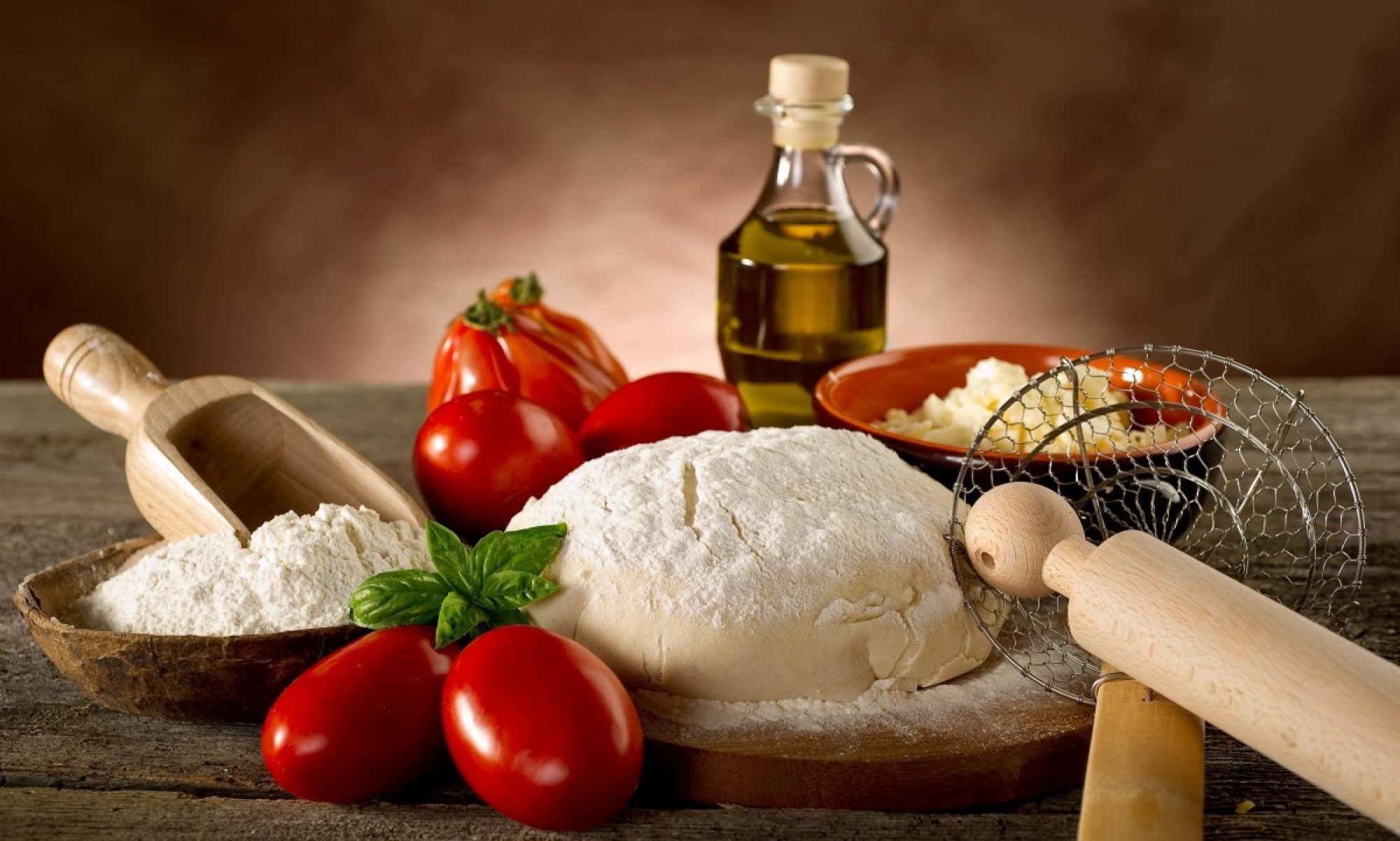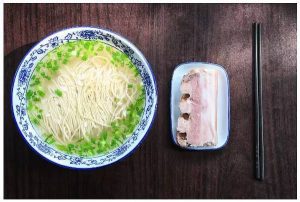Final research paper on Suzhou noodles:
The reasons behind the popularity of noodles in Suzhou
Alex Shen
My final paper for this course is also on the noodles of Suzhou, specifically, about the reasons behind the seemingly unusual passion of people of Suzhou for noodles. Since I have been dealing with noodles this whole course and have written several essays or conducted project on noodles of Suzhou, I might as well dig deeper in this direction and take my own comprehension for noodles to another level. I used the phrase “seemingly unusual” because noodle, or wheat, have never been and never will be the main source of food for the southern part of China, instead, rice is the everyday food for people here. Noodles can be found anywhere in the south, but it never acted as a major food source or dominated the dining table. However, as far as I know, the city of Suzhou consumes noodles no less than any other cities in the north (it is estimated that people of Suzhou consume five hundred tons of noodles on a daily basis), which is quite hard to explain given the facts above. A famous writer from Suzhou once wrote in his book “Epicure” that “the first thing came to my mind after I woke up was to go to Zhu Hong Xing for a bowl of noodles”, which also shows how much love people of Suzhou have for noodles and how common and routine it is to have noodles for breakfast in Suzhou. So, this paper will be me trying to understand the reasons for this phenomenon by conducting a fieldwork to one of the noodle restaurants in Suzhou, while deepening my comprehension of noodles of my city of Suzhou.
To be able to talk about noodles between the north and the south, I first need to go for the history of it. It is believed that wheat was introduced to Xinjiang, China about four thousand years ago, and was already ubiquitous throughout the entire China after about another thousand years. The wisdom of Chinese people quickly helped them invent flour, which was made by grinding wheat into white powder. Because of the climate difference between northern and southern China, wheat was cultivated in the north whereas rice in the south. It was the Song dynasty when China’s economic center shifted to the south around the city of Hangzhou. All the business men from the north swarmed to the south, bringing their own food with them, and caused a prosperous diversity of food in the southern area.
This was the story of noodles being introduced to the south, and noodles rooted here ever since. Next, I will try to analyze why noodles could stay here and thrive to become one of the main food sources of people of Suzhou. In order to do so, I conducted fieldwork to a noodle restaurant in Suzhou. The place is called Lu Zhen Xing, a famous noodle brand in the city. My father is a friend with the owner of this brand, and he introduced me to him and provided me the chance to conduct this fieldwork. This fieldwork is different from an interview in that I didn’t sit down with the owner and did some Q&A. Instead, I asked the owner for permission to stay in the restaurant for a whole day to observe. I could wander the kitchen, dining place and the cashier in order to fully glean all the information I needed. After the day, I concluded some reasons I thought was crucial to the popularity of noodles in Suzhou: the good taste of the noodle dish, the dainty of the food and the process of enjoying it, and how the cultural and economic factors of this region affected people’s decisions.
The kitchen was the first place I observed. Through the process of making the dish, noodles and toppings are separately prepared. First, we need to put the noodles into the carefully prepared soup, and then precisely fill the bowl of soup with how much noodle the customer needs. Finally, the toppings are put onto the top of everything and the noodle can be served. During the whole process, there were several important points that were decisive to the good taste of the noodle: the soup and the noodles. The toppings were already made and extraneous to some extent compared to the former two. The soup is made from stewing big and chicken bones, finless eel, shrimp and snails together for three to four hours, and rich flavor combined with clearness will be the signs for successful and authentic soup. I knew that some customers have the tendency to arrive early for clearer and more fresh soup, which people of Suzhou call “the first bowl of soup”, so I arrived at the restaurant at 6am that day to hope to be able to ask the them the reasons for coming so early and, fortunate enough, caught up with the first customer. He was a man in his fifties, wearing clothes that looked like a school teacher to me. His answer to my question was that he always starts his day early and a bowl of noodles with freshly made soup would wake him up and better prepare himself. The restaurant owner also told me that the only thing Suzhou noodles had in common with northern noodles it that they both put the noodles in a big bowl(usually southern noodles uses smaller bowls), because the soup of Suzhou noodles is so good that customers just cannot have enough of the soup after finishing the noodles. The noodles are also hard to make—-each customer has his or her own preference for both how the noodles should be cooked and how much noodles they want—–this sets up a challenge for the noodle handlers, that they must be experts in cooking the noodle to perfection and precisely dredge up the amount of noodles asked by the customer. To become a qualified noodle handler, one must go through each stage of learner, intern, and finally handler, which would take up to years to for this process to be finished.
I called the toppings “extraneous” compared to soup and noodles not because they are not delicious, but because they were made ahead. However, the huge variety of toppings is equally astonishing: bamboo shoots, stewed pork cutlet, deep fried and smoked fish, crab meat, spicy pork, duck and so on. All the different topping can satisfy customers with different tastes, providing important freedom in choosing the food they like. Making the topping is also arduous. For example, there is one topping that in order to prepare it, one needs to pan fries the head, body and egg of river shrimps together in order to make a dish, which would take several hours to finish. I mentioned the process of making the noodles and the challenge behind it to emphasis that only through such arduous and professional process of making the noodles can it taste so good, thus attracting the long-lasting love of people of Suzhou for it.
The good taste of the noodles of Suzhou can be easily understood as one of the reasons behind the popularity of noodles in Suzhou, since delicious food is always welcomed, but the rituals when eating it and the daintiness of this dish need to be further explained. After the observations of the first-arriving customers and the morning preparation of soup and toppings for the day, I went home for a nap and went back at lunch time. People of Suzhou usually choose to have noodles for breakfast or lunch (we don’t usually have it for dinner), and I sat at the cashier near the entrance of the restaurant to observe the customers, specifically how they ate their noodles. People of Suzhou have a lot of rules and rituals when eating the noodles, among which some might sound strange and inexplicable. Some of the rules or preferences were mentioned above, like asking for specific amount of noodles and how the noodles should be cooked. Others like whether to have abundant soup, choice of having green onions on top, or to drop some vinegar or spicy oil to enrich the flavor are all options to personalize the eating process. I personally like to have less soup, harder noodles, no green onions, and some sliced ginger immersed in vinegar as a side. I saw one elderly customer have so much preferences that the cashier had to write it down on a paper and pass it to the kitchen so that his demand could be perfectly met.
These were just the options that one can choose, there are also other rituals or rules that people of Suzhou like to follow. The preciousness of the noodles of Suzhou is that it reached a perfect balance between being a common dish in terms of the price and staying dainty at the same time. People of Suzhou have always had a reputation for living a fine or exquisite life, and noodles of Suzhou is a perfect annotation to that. Even the noodle is not expensive and cannot be considered fine dining, people of Suzhou, especially the elderly, like to put on proper cloths for a visit to a noodle restaurant early in the morning. After sitting down and being served a cup of tea, customers can call the servant and express his or her preferences for noodle. This is crucial because otherwise the chef would cook the noodles based on his choice. When the noodle is served, first put in the seasoning or sauces like spicy oil or vinegar to highlight some of the flavors that each individual customer like. Then, stir the noodles so that it can be evenly immersed in the soup, meanwhile put the topping into the soup as well because the toppings are usually cold. Although these rules for eating noodles may seem irrelevant to enjoying the noodles, there are things that you do not know why but still do it anyway. Even if you are new to this city and unfamiliar with the rituals and rules for having noodles in this city, you will get proficient with it because you will be surrounded with people doing it every time, every day you go into a noodle restaurant. Nine out of ten people of Suzhou would say they do not know the reasons why if you ask them why they should follow the rituals, but I guarantee that ten out of ten people would follow them when eating noodles. That is the interesting part of our rituals, that they are fascinating and somewhat quirky at the same time—-one would enjoy following them but at still sometimes ask themselves why they should do it and reach no conclusion. However, the reason behind the rules are not my primary concern, but what is expressed or masked behind the very behavior of doing them. I think it should be reasonable to say that when doing something that is mainstream with certain degree of delicacy, one would feel somewhat honored and grow more passionate in doing so. If at first the noodles came to Suzhou and after justification of it to better serve the taste of people of Suzhou, rituals are just as important as taste later on to hold this enduring passion.
One last reason for the popularity of noodles in Suzhou is due to the economic and cultural uniqueness of this part of China. Suzhou is in the Yangtze river delta area of China, located in the south-eastern part of China, where Yangtze river meets the East China Sea. This area was one of the first to be open to the world after the time when China shut the world off for several hundred years. So, people of this area have something unique: the ability to absorb what is from outside and take it as our own after some modification. When Song Gao Zong, the emperor of China, fled to Hangzhou back in Song dynasty, he quickly fell in love with the southern part of China, about which a poet wrote that he was mistaking Hangzhou to be the capital of China. So along with him, many officers and business men came to the south, some of them to Suzhou. According to data from Fudan University, 75% of immigrants to Suzhou were from Henan province, where noodles is considered the first choice of food. So these business men and officers, due to their distinguished identities, didn’t yield to the food customary here in Suzhou, but on the contrary, brought noodles with them and even influenced people here. As I mentioned before, people here can accept new culture quickly, so did they do with the noodles. They swiftly took this food in and started making it their own food. And the nature of business men in the DNA of people here helped them start noodle industries: there are traceable records of noodle restaurants in Suzhou back to at least three hundred years ago. In 1757, the city of Suzhou already had its first noodle association.
After both digging deeper into the history of noodles regarding Suzhou, and observing the noodle restaurant for a day, I now have a better understanding to why the noodles can become so popular in Suzhou. Not only did people here make it so delicious, but also there is now culture related to it, which is masked by the rituals and rules of eating it. And making it possible for everything to begin, the open-mindedness of people here played a crucial part, that it made people of Suzhou accept noodles at the first place.


